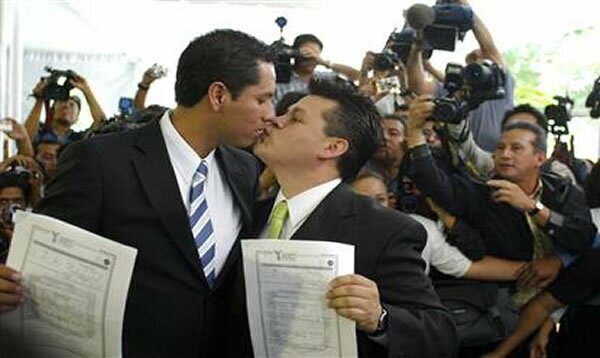
One of the reasons I found the “gay brownshirts” argument so frustrating is that it’s a distraction from the fight I really want to have with Mark Shea and other orthodox Catholics. I want to know why they think gay people are required to be chaste, why homosexual relationships are ‘intrinsically disordered.’ Mark put out a call to his commenters on my behalf for reading recommendations.
My questions are a little unusual, as I don’t think it’s necessarily wrong to limit the behavior (sexual or otherwise) of two consenting adults. As I wrote to Mark:
I don’t think it’s intrinsically unreasonable to tell a person (or a class of people) that sex is out of the picture for them. No one is guaranteed or entitled to a sexual relationship, and there are plenty of other impediments that can mean you can’t have sex with someone you love. (Having to break up with the Catholic boyfriend I loved is a case in point). So, in theory, I don’t object, but I don’t understand why having the beloved be of the same gender means you wind up on the impediments list. That’s what I’d like to read a defense/explication of.
It’s not just a question of differing religious premises; I can’t wrap my head around how some of these arguments work within a Catholic framework. The explanation I usually get comes down to natural law: the male and female bodies fit together like a lock and key, which tells us something about the privileged status of that kind of sexual congress. Now, there are some objections that people raise (some heterosexual couples are infertile! gay people can adopt or be impregnated! etc), but I’m willing to grant that the qualitative difference exists: only male-female sex has procreation as a possibility by default.
But I don’t think this fact has many necessary logical implications. Ok, so gay people won’t ever have the same kind of relationships as straights. I didn’t need to go to a priest to learn that; plenty of queer theorists would have told me the same thing. Arguing that eros in same-sex relationships is different from what you find among straights isn’t the same as arguing that it is proscribed.
In fact, if I want to reason from nature, there aren’t really enough queer people in the world to threaten the reproductive project, even if all the bi people ended up with same-sex partners. There’s room for a parallel structure of relationships. And we’ve got some models to draw on.
Friendships (whatever the gender pairing) can be emotionally intense, but non-sexual. Some relationships can have an erotic frisson without being sexual (I’m thinking here of Sherlock and Irene Adler in the BBC’s Sherlock, where they’re both infatuated, but only by the other’s intellect). So why are romantic same-sex relationships not ok in the same way as these are? Here are a couple reasons I’ve heard and don’t find convincing:
Same sex relationships are narcissistic (version one) – If you’re dating someone of the same sex, aren’t you basically dating yourself?
I’m not really going to waste time expanding this objection, my response to it is here: “What about other Others?”
Same sex relationships are narcissistic (version two) – If it’s just the two of you and your relationship isn’t directed toward children, aren’t you isolating yourself with a kind of selfish love?
Aside from the what about older/infertile couples objection, I think this genre of objection sells short friendship. The ways that a marriage changes you will spill over into all your relationships; parenting isn’t the only way to be of service to someone. You can see more about what I think marriage is for here: “Whaddya Wanna Get Married For?“
So, if Catholics want to convince me that active homosexuality is incompatible with the faith, I’d like to hear about why my objections to the above don’t cut it or hear some new arguments about why different means disordered.











